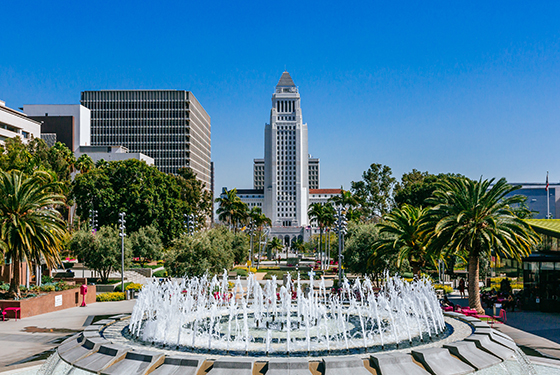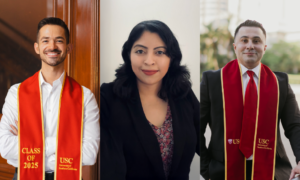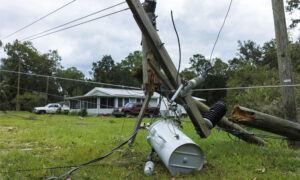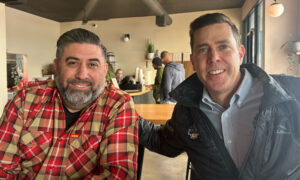Cecilia Elena Rouse, president of The Brookings Institution, was the keynote speaker at the 2025 Commencement ceremony for the USC Price School of Public Policy. Rouse, a labor economist, made history as the first Black American to become Chair of the Council of Economic Advisers, an agency within the Executive Office that provides objective economic advice to the U.S. president.
In her speech, Rouse told graduates that every generation has faced major challenges – from economic uncertainty to geopolitical crises – and that the Class of 2025 has the chance to make a difference. She also offered professional advice she’s learned through the course of her career. You can watch the full speech in the video above or read her prepared remarks below.
To the class of 2025—congratulations! I am honored to be here celebrating with you today.
Now, I hear some of you kicked off the celebrations a bit early—with a fortifying breakfast at “the 9-oh.” I can only hope my speech will be just as intoxicating.
(Or at least, won’t leave your head pounding.)
Class of 2025 — all 5,000 plus of you — you are the newest chapter in the history of the USC Price School of Public Policy.
That story began in 1932, when three students earned the school’s first ever undergraduate degrees.
Let me tell you this: That small but mighty class didn’t have it easy. When they received their diplomas:
· The stock market plummeted.
· Tariffs on taxable imports skyrocketed to 60 percent.
· And as jobs vanished during the Great Depression, the U.S. government drove around one million people of Mexican descent out of the country — over half of whom were American-born.
Sound somewhat familiar?
It’s human nature to feel that what we’re living through is somehow unprecedented. But history tells us otherwise.

Master of Public Policy
Advocate & Innovate for a More Just World
Effective public policy has the power to disentangle increasingly complex global and domestic challenges. With an MPP from USC, you will have that power too.
Find Out MoreEvery generation has faced its challenges.
The class of 1932 confronted economic disorder, with some similarity to what we’re experiencing today.
In 1962, students graduated under the looming threat of nuclear war.
In 1992, the Bosnian War erupted—as did riots, right here in Los Angeles.
The truth is, there’s never been a graduating class of USC Price that didn’t walk into fear; that wasn’t forced to face some kind of uncertainty.
No one gets a free pass through the hard stuff. But if you’re sitting here today, I doubt you were expecting one.
This is a public policy school. So, I think it’s fair to say a lot of you applied here because you wanted to make a difference.
Well—good news. There’s definitely a difference to be made.
Like every graduating class before you, the world’s problems are your purpose; the world’s cruelties, your call to action.
For me, that call came through economics.
Over the past thirty years, I’ve investigated questions in labor economics at Princeton, did three White House tours—including during the Great Recession and the COVID-19 pandemic—and now I lead a think tank dedicated to addressing societal challenges.
As I’ve personally experienced: a career in public policy is not an easy one. It requires learning how to navigate hard times—and how to sustain yourself through them.
So—from my time in academia, public service, and now the civil sector—here are my top three lessons:
- One: It takes an idea to beat an idea.
- Two: There are only 24 hours in a day.
- And three: Always question inertia.
So, let’s start with the first lesson. Just like in 1932, we are living through a fraught economic moment.
For many Americans, the dream of upward mobility feels increasingly out of reach. The system seems rigged, and everyday life has become too expensive.
Consider a basic staple: a carton of eggs that cost $1.70 in 2018 now sells for $6.20 today.
The median price of a new home has soared past 400,000 dollars—that’s median, not luxury. And renters don’t have it easy, either. Nearly half spend more than 30 percent of their income on housing, a level considered financially unsustainable.
Oh, and if you want to start a family? It now costs around 300,000 dollars to raise a child to age 18. And that doesn’t even include college tuition.
Challenges mean there’s work to be done—new ideas to be generated and debated—and with that, the chance to have a hand in shaping our collective future.
Cecilia Elena Rouse
Globally, most people now believe the next generation will be worse off than their parents.
This growing sense of unfairness—that the financial stability once achievable through hard work is slipping away—is one of the defining challenges of our time.
The federal administration is trying to meet this challenge—with new policy shifts in immigration, taxation, and tariffs.
You might disagree with their approach. That’s not only acceptable—that’s essential. Healthy democracies depend on debate, on competing visions and differing perspectives.
But no one is inspired to rally around a complaint. Screaming “what they’re doing sucks” is not a strategy—it’s a dead end. It sucks the air out of the room and the inspiration out of forward movement.
If you really want to move the needle on today’s issues, you have to offer an alternative. Your alternative may not be the ultimate solution—but it could spark a conversation that generates momentum.
As I said, it takes an idea to beat an idea.
And with your world-class education from USC Price, I am sure you can come up with a few interesting ones—whether it’s to fight economic insecurity, the housing crisis, the rising cost of child care, or whatever issue you are most interested in.
Now, onto my second lesson: There are only 24 hours in a day. Deceptively simple. Inescapably true.
We think that with ever-improving technology like Chat GPT, or the illusion of multi-tasking, we can somehow beat time. But time is the hardest, and most intractable, of all constraints.
This constraint forces all of us to make decisions—identify our highest priorities, do them well, and learn to give up things when we have to.
I, for example, miss diving into all-consuming research. But at Brookings, my focus is on leading the Institution. Because there are only 24 hours in a day…
… And I hope you waste some of them. Nap a few hours away on the couch. Stay up late, call your best friend, always order dessert—especially if it involves chocolate.
There are only 24 hours in a day—for your work, yes, but also for you. Don’t forget that. You can’t help others if you’re winded yourself.
Now, my final lesson: Always question inertia.
In physics, inertia is the tendency to keep doing exactly what you’ve been doing—unless an outside force intervenes. If we’re not careful, life can work out the same way.
Graduation ceremonies are one of the rare moments in life when society actually encourages you to follow your passions. Take risks. Embrace failure.
If you started an internship tomorrow, you would likely be celebrated. But fast-forward ten or twenty years. You’ve spent decades in finance — and suddenly, you want to walk away. Maybe take an internship in a different field instead.
Some people might smile and say, “Hey, good luck!” Others might raise an eyebrow; roll their eyes; stifle a laugh.
But please, do it anyway.

Master of Public Administration Online
Advance Vital Institutions
Advance your career and the institutions you serve with our exceptional MPA online.
Find Out MoreThe career path you’re starting today might be the one you stay on for a lifetime. Or not. Either way, each step of the way, I encourage you to question inertia.
Not just at your graduation ceremony, but throughout your life, make it a habit to ask yourself: Am I spending my time on what truly matters to me, or just following what I think I’m supposed to do? The so-called “logical” next step?
In my own career, rather than sticking to a rigid plan, when faced with a choice, I’ve generally selected the job that sounded the most interesting and challenging at the time.
Because it’s never too late to question inertia. And it can be fulfilling to change direction. That’s how I ended up as president of Brookings, and why I’m here with you today. Not a bad gig.
Before I close: Class of 2025, the class of ’32 has a final lesson, and they’re insistent I pass it along to you:
1932 was a year of crisis for our country. But it was also a precipice of possibility—a moment when ideas once dismissed as unrealistic suddenly became achievable.
In 1933, the New Deal was born—radically expanding the role of the federal government in economic and social affairs.
In 1935, the Social Security Act was signed. It’s commonplace to us now, but at the time, it was revolutionary.
And also in the 1930s, prohibition came to an end… for which the 9-oh is most grateful.
So, class of 2025, like the class of 1932, you’re stepping into a world with no shortage of challenges.
But challenges mean there’s work to be done—new ideas to be generated and debated—and with that, the chance to have a hand in shaping our collective future.
I am confident that all 5,000 plus of you will make a difference—just like the USC Price graduates before you, each facing their own iteration of an uncertain world.
I can’t wait to see what you will do next.
Thank you, USC Price, for having me. And to the class of 2025, congratulations once again!



